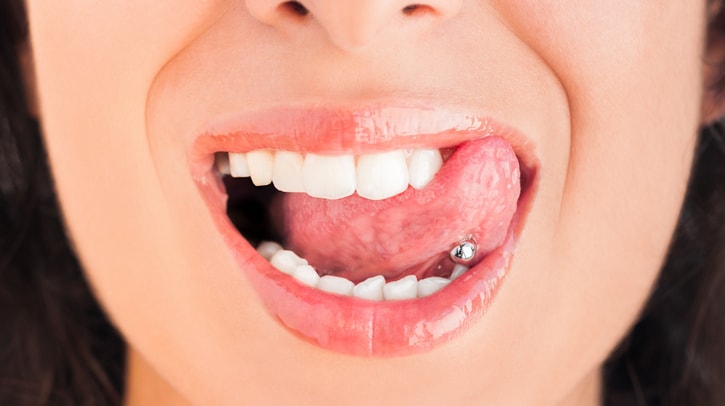 Body piercing has become a popular form of self-expression as a fashion statement and is also a practice undertaken for cultural reasons.
Body piercing has become a popular form of self-expression as a fashion statement and is also a practice undertaken for cultural reasons.
Significant health risks exist to individuals from the piercing process itself. With piercing salons mostly unregulated, the self-trained staff may have very little clinical and anatomical knowledge of the position of nerves, arteries and veins which can cause serious issues.
In the best case scenario, soreness and swelling will be the only symptoms experienced following the piercing procedure. However, tongue and lip piercing can lead to emergencies immediately after the procedure or life-long problems
Tongue Piercing
Piercing of the tongue, in particular, carries a significant risk of infection. The tongue naturally accumulates bacteria, and when bacteria penetrate through the piercing and into the inner tissue of the tongue, they can cause infection. It is imperative the wound receives correct care during the healing process as food, smoke and liquids that come in contact with the piercing might increase the risk of infection.
Swelling of the tongue is a side effect of all tongue piercings. In severe cases, however, the tongue can swell so much that it can partially close or completely compromise the airway, resulting in difficulty breathing. Should this life-threatening emergency occur, medical assistance will be required immediately.
If the tongue is pierced off centre (either by intention or by accident), the major blood vessels can be pierced or severed, leading to significant and uncontrollable bleeding. It may also cause nerve damage which may cause permanent numbness, loss of movement, loss of taste and speech impediments.
Once healed, tongue piercings can cause dental complications such as chipped or broken teeth. A chipped or broken tooth may not sound too bad but, when left untreated, the nerve in the tooth may die and become abscessed, leading to pain, swelling and even hospital admission.
Lip Piercing
Lip piercings tend to heal quite quickly, however, like tongue piercings, the wound requires appropriate care during the healing process as food, smoke and liquids that come in contact with the piercing might increase the risk of infection. Nerve damage is still possible and may affect movement and feeling.
Once healed, retainers on lip rings and studs can rub against the adjacent gums causing them to recede and expose the root of the associated tooth. In severe cases, gum grafts may be required to repair the damaged tissue. Like tongue piercings, teeth may become chipped and develop an abscess.
Still thinking of a piercing?
If you or someone you know is still thinking about getting a tongue or lip piercing, the Australian Dental Association (ADA) has a few suggestions:
- Ensure the practitioner performing the procedure is experienced, is aware of your oral anatomy and uses strict infection control practices, to guard against the risk of infection or long-term damage.
- Seek immediate medical advice if excessive bleeding, swelling or pain occurs following a piercing
- If infection occurs seek urgent medical help
- Once the piercing heals, the ADA recommends visiting your dentist every six (6) months. Your dentist will be able to closely monitor the piercing and any potential damage to teeth and gums.
- It is important to remove piercings before playing sport as the piercings can be ripped accidentally from the skin.